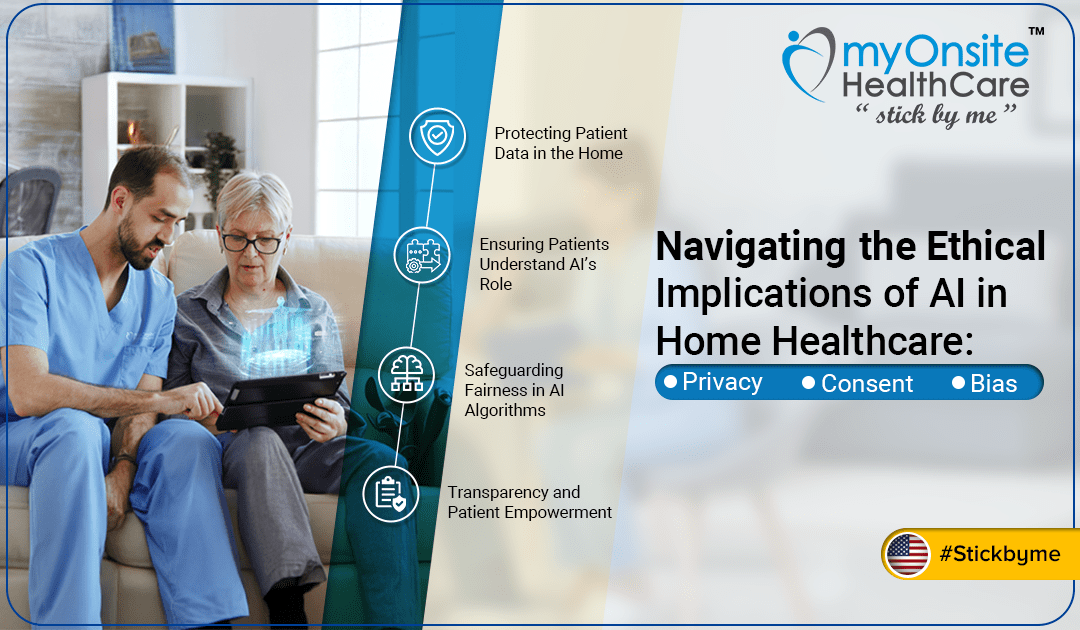As AI becomes more integrated into home healthcare, ethical concerns surrounding patient privacy, informed consent, and algorithmic bias come to the forefront. myOnsite, a forward-thinking home healthcare provider, is ideally positioned to leverage AI-driven tools to deliver value-based patient care, which can improve both patient convenience and the quality of healthcare. Through AI-powered solutions like real-time monitoring and personalized treatment suggestions, patients can receive attentive and proactive care. However, these advancements demand careful consideration of ethical challenges to maintain trust and ensure responsible use.
Privacy: Protecting Patient Data in the Home
Patient privacy is a top priority for myOnsite. In home healthcare, wearable devices and remote monitoring tools continuously collect patient data, tracking vital signs like heart rate and blood pressure to detect potential issues in real-time. Although this data enables faster response to health concerns, it also introduces privacy risks, as unauthorized access to sensitive information could compromise patient confidentiality and safety. myOnsite addresses this risk by encrypting all patient data in transit and at rest, maintaining HIPAA compliance, and rigorously updating its security practices to adhere to best practices in data protection.
Consent: Ensuring Patients Understand AI’s Role in Their Care
Informed consent is essential for patients to feel secure with AI-integrated healthcare. At myOnsite, patients are fully informed about the extent to which AI is used in their care, including what data is collected, how it is used, and the potential benefits and limitations of AI applications. For example, if an AI tool monitors symptoms or predicts health issues, patients receive clear explanations of how these insights will shape their care. This transparency not only respects patient autonomy but also helps alleviate any discomfort or concerns they may have regarding technology in their healthcare experience.
Bias: Safeguarding Fairness in AI Algorithms
AI algorithms used in healthcare are only as impartial as the data on which they are trained. If an AI model is developed using biased data, it risks reinforcing disparities in healthcare outcomes, especially among underrepresented patient groups. myOnsite is dedicated to minimizing algorithmic bias by carefully selecting and evaluating datasets, ensuring diverse representation, and conducting regular audits to assess AI accuracy across different demographics. By taking these proactive steps, myOnsite aims to deliver fair, equitable healthcare that respects the individual needs of all patients.
Building Trust through Transparency and Patient Empowerment
myOnsite believes that patient trust is key to the effective use of AI in home healthcare. By being transparent about data collection, AI functionality, and privacy safeguards, myOnsite empowers patients to make well-informed decisions about their healthcare. Furthermore, patients can opt out of certain information-sharing practices without jeopardizing their access to care, reinforcing myOnsite’s commitment to patient-centered service.
Conclusion
As AI becomes more prevalent in home healthcare, addressing ethical concerns like privacy, consent, and bias is crucial for fostering trust and delivering responsible care. myOnsite is committed to transparent communication, robust security measures, and ongoing efforts to reduce algorithmic bias. By prioritizing these ethical considerations, myOnsite aims to enhance patient well-being while honoring its commitment to privacy, informed consent, and equitable treatment for all.

